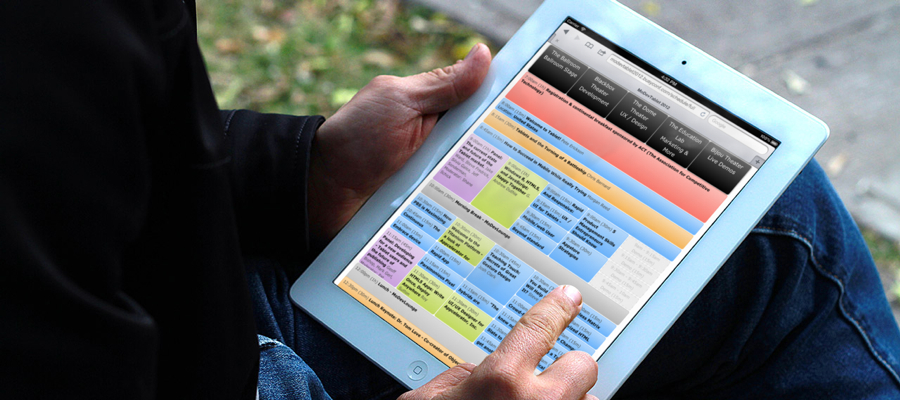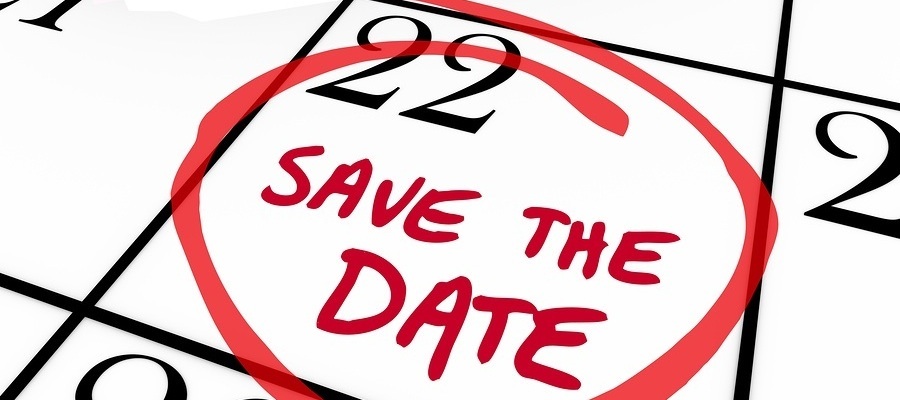Previous page

In today’s digital world, there’s no better means of marketing than the
internet. From webpage advertising to banners in apps, the internet has
revolutionized the way we get word about new ideas, products and events.
One of the best ways to market via the Internet is social media. If you
are running an event or show that you need to spread the word about,
social media can be a great outlet to reach people and fast. (Users of
social media essentially do the marketing for you with a click of the
share button and it’s free, too!) If you want to learn more about
marketing your event on social media, then check out the list below. It
contains 4 great ways to harness social media platforms in order to
promote your event.
1. Use photo and video sharing apps to give a sneak peek.
Some of the most popular social media sites today are photo and video
sharing apps like Instagram and
Vine. Instagram, owned by
Facebook, allows you to share photos and videos
with friends who follow you, and Vine, owned by
Twitter, allows you to share videos with friends.
Both Instagram and Vine are a great way to build excitement about your
event by sharing visual sneak peaks of what attendees can expect. Show a
clip of speakers rehearsing or photos of the decoration and setup.
Giving potential attendees a glimpse into what they might get if they
come will make them even more motivated to show up.
Long before your event, create a specific Twitter
hashtag
for it. Include the hashtag in marketing materials and original
promotional material, and you can start generating buzz around Twitter
about it. Tweet regularly about the event with the hashtag, and people
will start checking Twitter to get updates and learn more. Retweets and
favorites on Twitter can also help spread the word to more people as
friends of those tweeting find out about your event.
3. Use LinkedIn
Particularly if you’re hosting a corporate or professional event (or an
online webinar), LinkedIn can be a great
resource for spreading the word about an event. Experts suggest posting
event details and a link to RSVP on your company’s page. Then, people
that check your company’s page can find out about the event or choose to
come, or they can share it with people they’re connected to who they
think will find relevant. You can also share info about the event with
related groups on LinkedIn; they are groups of professionals with common
interests, and will most likely all be drawn to the same event.
4. Meetup.com
It might not be as popular as Facebook or Twitter, but
Meetup.com is a great way to promote an event
especially because everyone who is on it is looking for things to do and
people to meet. Connect with pre-existing groups of people and
communities on Meetup, and share your relevant event with them. Chances
are they will be interested in going, and many times you’ll be able to
entice an entire group that knows or attends events together.
Sources
- https://socialtimes.com/5-ways-to-promote-live-events-using-social-media_b136864
- http://socialtimes.com/5-tips-to-promote-online-events-using-social-media_b136873
- http://www.mediabistro.com/alltwitter/social-event-planning_b40689
- http://www.digitalmarketingdepartment.com/5-ways-to-use-social-media-to-promote-your-nonprofit-event/

Congratulations. Your event just went from being an idea to a real thing. You have a planning committee set up, maybe a few speakers and activities in mind, and a general overview of what you want your event to be.
You start looking into venues, equipment rentals, tools you need to plan your event, event marketing costs, and the dozens of other costs involved with planning an event.
You come to a realization: you need sponsors.
Sure, you can cut costs and go lean, maybe skip a few unnecessary items, but the reality is, most people are bombarded with a variety of different events they can attend. To put on a quality event that is worth attending, you need a sizable budget, and one of the most common sources of funding for events is sponsorship revenue.
The first step to courting sponsors for your event is to create a sponsorship prospectus, also known as a conference concept document.
The purpose of a sponsorship prospectus is to effectively communicate the value of sponsoring you event.
For sponsors, the value of sponsoring your event can come in the form of more customers, increased brand awareness, and/or an increase in community engagement. A potential sponsor’s goal when reading your sponsorship prospectus is to gauge whether your audience is relevant, large, and active enough to invest in it.
Having a good sponsorship prospectus is essential for any event trying to find sponsors.
Getting started
The first page of your sponsorship prospectus should be a high level overview of your event with metrics on the event and the demographics of its attendees.
The statistics you should include depends on whether or not this is the first year the event has been held. If your event recurs annually, then you can use statistics from past events. The number of attendees, and demographics of those attendees, such as careers, age, education level, and geographic location, should be considered.
Metrics about the event, or the organization or team behind the event, are also important. Metrics that potential sponsors may be interested in include social media activity surrounding the event and the social media reach or popularity of the event organizers.
Use graphs and charts to communicate these metrics visually.
Showing off your event
The next page consists of the qualitative aspects of the event – how long the event has been running, the format of the event, topics covered, the target market of the event, and more information or short biographies of the event organizers.
It is important to frame the event description to appeal to sponsors. Show sponsors the opportunities they have to reach a certain demographic or target market, to influence a community, or be a part of something big.
It is also recommended that you include pictures of past events.
The final few pages of your sponsorship prospectus should communicate specific sponsorship information such as sponsorship levels and slots, along with pricing.
You can use sponsorship tiers, such as bronze, silver, and gold, where each tier includes a certain amount of sponsorship perks, such as free tickets, sponsor logos on banners, or sponsoring an after party.
Alternatively, you can present this information as à la carte sponsorship slots, where each sponsorship opportunity is sold separately. For example, sponsoring a talk would cost a certain amount, while sponsoring a drink-up would cost more. Having sponsorship slots allows sponsors to choose which aspects of the event they want to sponsor and allows the event organizers to have more sponsors.
Remember that the sponsorship prospectus is effectively a sales pitch, so it is important to include the reach of each sponsorship level or slot. For a sponsorship slot on the event website, this might be the number of visits the website receives.
Finishing touches
After editing, reviewing, and maybe a few changes, your sponsorship prospectus is done. Except for one thing.
Sponsors need a way to pay you. You can have sponsors send a check by mail, or use event management software like BusyConf to sell sponsorships online.
P.S: If you’re looking for a way to make your event better and increase sponsorship revenue at the same time, BusyConf’s mobile event schedules have a banner that you can sell as a sponsorship slot. Contact us for more information at .

When you’re caught up in paying for advertising, handling your social
network accounts, and setting up an event, some marketing channels get
overlooked. Don’t forget about the on-site marketing tools you have,
such as your business blog. When an interested party finds out about
your event and wants more information than a tweet or Facebook update
provides, they head to your website. If you aren’t sure how to
effectively promote your event through your business blog, use a few of
these pointers to get you on your way.
1. Provide frequent updates on your event. Write about topics such
as the latest speakers you have lined up, the event venue, important
registration dates and reminders, behind the scenes information, and
related topics. Mix up the topics and space the posts out so you have a
steady stream of content directly relating to your event. You don’t want
to post three updates at once, then go a few days without anything at
all.
2. Invite your readers to commentand give their input on your
event. Use a blogging script that makes it easy for readers to give you
feedback. You may be surprised at how useful the comments are,
especially in fixing problems you may have overlooked when you’re in the
middle of organizing your event.
3. Build authority for your event by posting about related industry
news and developments. You want to give your readers a reason to trust
that your event is worthwhile, so setting yourself up as an authority
figure in the field is important. Talk about current events and the
movers and shakers in your industry. This also gives you content not
directly related to your event, so you build a long term following on
your business blog.
4. Set your business blog up so it auto-posts to social networks with
each blog post. This not only automates the process, but also gives
you more content to work with on your social networking sites so you’re
killing two birds with one stone. If you’re using a popular blogging
script such as WordPress, you have several plugins available that take
care of this need. You may need a third-party app or custom solution if
you’re using a different type of content management system.
Don’t let your business blog languish when you’re preparing for an
event. Give your readers the information they need about the event, and
provide sticky and relevant industry content so they build trust in you
and are likely to have multiple visits to your site.

Although we all dream about planning events with a huge budget to work with, that’s rarely going to be the case. Occasionally, there is only a limited budget available, and as such, we must make the best of what is at our disposal.
Here are 5 ways in which to plan an event on a tight budget.
1. Establish the event type and then select the venue.
When it comes to choice of venue, you should stick very closely to your overall budget. The venue may well be your greatest expense, and therefore, you should make the final decision early within the planning process.
2. Do not be afraid to negotiate.
The art of negotiation is an integral part of your overall itinerary when you are planning an event. Never be afraid to try to negotiate, because the worst case scenario would be a simple “no.” Vendors tend to prefer working with clients who prove to be honest about their budget at the outset, so be upfront with them and do not shy away from full budget disclosure. It’s also possible that you might be able to avail lower rates with the site vendor by offering to advertise the venue during the actual event.
3. Seek the assistance an event planning expert.
By seeking the help of a colleague or a team that plans events professionally, you may be able to benefit from prices that would not have been available to you otherwise. After all, this could be their particular area of expertise, and they may well be familiar with vendors and other professionals who are able to provide goods and services that are within your pricing structure.
4. Utilize the resources you have to hand.
Using your team’s skills can be key to success. If you are unable to afford a professional event planner, do not shy away from soliciting help from fellow friends and co-workers. There’s a lot of work involved in planning an event, so requesting help from your team can prove to be particularly 5.
When appropriate, use social media to spread the word about your event. Use Twitter, Facebook and/or LinkedIn to gain free advertising. If your company has a list of subscribers, send out an email about your event. The more the word gets out there, the less pressure there will be on dealing with other marketing initiatives. Get inventive by using resources like Microsoft Office (PowerPoint, Publisher, or Word) in order to create flyers and invitations. Alternatively, outsource this to a local printing company that will offer to work within the confines of your budget.
Conclusion
When planning an event on a tight budget, the key to success is to stick rigidly to the account, and try to utilize any help which is freely available to you. Do not be afraid to negotiate on price, and consider hiring an expert event planner. Expert event planners may be costly, but they will radically cut your workload and may even save money overall.

The first step in planning an event is determining the type of event you’ll hold. Are you planning on a formal or informal event? For most events, including weddings and parties, you have the option of making it formal or informal, depending on your preference and event theme. So, what exactly is the difference between formal and informal events? What is required in planning and hosting them?
Formal events are what you would expect in a ceremonial environment–people dressed in formal wear following a specific official event protocol. Only invited individuals are expected to attend such events. Informal events, on the other hand, are the events which do not adhere to the standard mode of formal dressing and event protocols. They are flexible and can incorporate many elements without paying attention to whether they are formally acceptable or not.
Because of their strictness, many people would only associate professional event planning with formal events. Event planning, however, is also critical to informal events since they also require adequate preparation to make them successful. Here are some of the most critical considerations you need to make in planning formal and informal events:
Timing
Formal and informal events are held on different days at different times. Most formal events, like executive dinner parties, conferences and exhibitions, are held on weekdays while informal ones are scheduled on weekends. This rule, however, does not apply to all types of events. Some formal weddings for example, are held on weekends when everyone is away from work.
Dress Code
The main perceptible difference between formal and informal events is the dress code. Men in a formal events are expected to dress in tuxes, suits, blazers, bow ties and formal shoes while ladies in gowns, formal dresses and lady suits. Informal events on the other hand, allow their guests to dress as they please. To make your event colorful, you should choose a dress code which corresponds to the theme. Guests at a formal event for example, could be requested to dress in a smart-casual wear with colors corresponding to the theme.
Entertainment
Music significantly dictates the ambiance in an event. If you’re in a formal dinner party with your work mates, you’d expect to have some soft music like jazz playing on the background. Some formal events like conferences don’t even need any music at all. The informal events on the other hand, are characterized with blaring music like rock, electro, house and dance to set the mood for partying and dancing.
Because of the significant differences between these two types of events, it’s important to adjust the planning process according to the event. Finally, make sure that everything is put in place 24 to 36 hours before the event regardless of whether it is formal or informal.

You secured an amazing venue, have enough discounted hotel rooms to accommodate every attendee, and now all that’s left is to figure out the convention schedule. Much of your time in convention planning involves balancing the schedule in a way that makes the event feel full at all times, while facilitating meal break times, set up and tear down times, and other matters that concern your class and workshop presenters.
-
Establish how much time you have for workshops and classes. Once you know exactly how large the time blocks are, you can start to work in what the main draws are with workshops and classes, and how much programming you need to fill up all of the schedule blocks.
-
Physically examine all of the spaces for workshops and classes to determine the size and any special features of the room. For example, rooms with windows, centrally located rooms, and those with special architecture features which may cause a problem, such as pillars.
-
Send a survey to all of your presenters to determine how much equipment they need in their spaces, whether they have any special room requirements, and their preferred time. This way you avoid having a lot of grumpy presenters in the morning, who simply aren’t morning people in the least.
-
Use a scheduling tool instead of scheduling by hand. Balancing a convention schedule is as much of an art as a science, and getting help from a tool set takes some of the pain out of the process. BusyConf.com allows you to balance out the workshops that are going to form the keystone of your programming with smaller classes throughout, giving your schedule a mix of must-see workshops and downtime that keeps all of your attendees happy. Another advantage to using BusyConf is its ability to streamline the review committee process, automatic mobile schedule creation, and easy-to-use registration.
-
Don’t overload the schedule. You want to put breaks around the standard lunch and dinner hours to give your attendees time to grab food. Work with the hotel or local restaurants for the best hours for these breaks, so they aren’t getting overloaded during their normal lunch and dinner rush hours. By putting breaks in the schedule, you also give attendees time to network and socialize, instead of making them feel as though there is always pressure to attend the next session.
Conventions require a great deal of time, energy, and effort in order to be successful. You can have the best venue and attendance in the world, but if your scheduling is problematic you’re going to alienate presenters and attendees alike. Use all of the tools at your disposal to create a schedule that makes everyone talk about how excited they are about the next time the convention comes into town.

Want great booth ideas, speakers or activities that people will actually
enjoy at your next event? There is one free, fool-proof way to get all
the ideas you need without a focus group. Here is how you can plan the
perfect event using an unusual brainstorming technique.
Go to the People
The number one best way to get killer ideas for your event is to go to
the people that will be attending it and ask them, point blank, what
they want. There’s no need to go door to door or to send out surveys,
though.
If you have a Facebook page or Twitter account for your business, you
already have people ready and willing to give you their opinion.
Recently, a fundraising event planner decided to expand their Zombie
Walk into an all-day festival, but they needed ideas for events that
people would actually want to attend to fill the day’s itinerary. So, he
went to their Facebook page with a few ideas and pitched them to the
page’s followers. Within a few hours, the event planner had hundreds of
opinions and many new ideas. With just a few minutes worth of time, he
was able to ascertain which ideas where hits, which ones needed some
work, and he also had a list of new ideas. That’s a clear win.
The Anti-Social Media Alternative
What if you don’t have a Facebook or Twitter following that is big
enough to offer any value? Well, there are plenty of places online where
you can reap opinions from very passionate people. The best places to go
are forums that target the people that will be coming to your event.
For example, if you are having a small conference for work at home
mothers, and you wanted to know what kind of classes or speakers work at
home mothers would find interesting and valuable, hit the
WAHM forums and ask them. People are on forums
because they want to share. You may be surprised at how many replies you
get.
Remember, though. Be friendly and be courteous when visiting a forum for
the first time. Of course, it is always best to approach forums in which
you are a long-time member for the best results.
If you don’t have money for focus groups and don’t have time to send out
surveys, these methods are ideal for finding great event planning ideas
that will please your attendees.

The most critical requirement in hosting an event is finance. Additionally, you’ll need a well-structured budget to manage the funds and ensure that they are distributed accordingly. Unfortunately, most people do not stick to their budgets. They end up spending more than they hoped they would. The major reason behind this is poor event planning. Unless you have professional event planners organizing your party and managing your funds, you’ll probably end up spending more than you had budgeted for.
Event planners are very reliable in managing and minimizing event budget. Although you will pay some fees when hiring a planner, his/her services will help you a lot of finances. It should therefore be considered as a worthy investment.
There are many ways that event planners can minimize your budget. To begin with, they are very knowledgeable and experienced in managing event budgets. This helps in aligning the budget according to the type of event, host’s preferences and number of guests. Additionally, it prevents the cropping up of costs which are not accounted for in the budget.
People who host events without the help of professional planners always hire caterers to prepare food and drinks for the guests. Although this may not be such a bad idea, it is more expensive than hiring professional planners. That’s because planners also provide catering under an affordable event package.
Apart from catering, another costly element is equipment hiring. Most people do not have the equipment required to host an event. They therefore hire chairs, address systems, cooking equipment, tables, cutlery, tents and decorative items any time they host one. Unfortunately, hiring these items separately is very costly. The only way to minimize the costs is hiring an event planning company which additionally provides the hosts with the necessary equipment.
Some event planners also provide transport to event hosts and guests. They connect the hosts to transport companies with luxury vehicles for events. This helps hosts spend much less than they would have if they hired the cars separately.
Ultimately, event hosts end up saving more money than they would without event planners. Professional planners are therefore not only effective in the actual planning, but also in minimizing the event budgets.
Sources:
- http://www.entrepreneur.com/article/37892
- http://mashable.com/2010/10/04/event-planning-social-media/
- http://www.wildapricot.com/membership-articles/eg-how-to-plan-an-event
- http://eventplanning.about.com/
- http://eventplanning.about.com/od/eventcareers/f/eventplanneris.htm
- http://www.wikihow.com/Become-a-Certified-Event-Planner
- http://www.forbes.com/sites/shenegotiates/2011/10/27/make-it-work-the-zen-of-event-planning/
- http://career.opcd.wfu.edu/explore-careers/event-planning/

Your event’s website is often the only chance you get to convert visitors into attendees. It is also a resource for attendees who need access to event information, schedules, and instructions. Unfortunately, event planners often overlook their website and do not take advantage of the opportunity to showcase their event to potential attendees. For those who are interested in creating an event website that will serve as a valuable event marketing tool and a tool for attendees, this is an easy to follow guide on optimizing your event website for attendee happiness.
Download the Perfect Event Website Checklist!
1) Dates of the Event
This one is simple enough, but unfortunately it is something that many event and conference organizers forget to add. The dates of your event should be the single most visible thing on your website. Visitors should not have to scroll down to see the dates. If you want to go even further, use an “add to calendar link” to make it easy for visitors to add the dates to whatever online calendar you’re using. The date should be “above-the-fold”, meaning visitors should not have to scroll down to find it.
3) Venue and Relevant Addresses
The event’s venue and all addresses relevant to the event such as after parties and hotels should be easy to find on your event’s website. It is crucial that the address be displayed in large and clear font. Attendees will often go on your website for quick access to the event address. With Google Maps, you can even create a small map to embed on your website that shows visitors the location along with important areas nearby.
2) Speakers and Activities
People want to know what they’re in for. Having pictures and short biographies of speakers can help promote your event and your speakers. A bio should include what the speaker is known for, social media links, and a little information on what they will be talking about. We recommend asking speakers to submit a short bio along with their talk proposal.
4) Link to the Event Schedule
For your attendees’ sake, do not make your schedule hard to find. A link to your schedule should be on your website and all social network profiles. Attendees need to have access to the schedule at all times so they know what is happening at your event. if you’re using a mobile schedule, and you definitely should be, instruct visitors how to use it. Sometimes that means installing a third party app and then entering a code for that specific event. If you’re using a BusyConf schedule, attendees simply save the schedule to their home screens. Avoid friction and instruct users how to access the schedule, regardless of how simple it may seem.
5) Registration/Attendance Page
If people want to attend your event, make it easy for them to do so! Include a link to the event registration page on your website and every social network profile with a clear call to action such as “Register Here”. Again, have clear instructions on how to register for your event. You do not want to lose attendees because they did not know how to register for your event.
If you are organizing an event, then it is a given that someone will need to contact you at some point. Whether that be an attendee, press, or anyone else, make it easy for them to find your contact information. Having a basic email such as “info@yourevent.com” is not enough. Include the personal contact information of the event organizers, including phone numbers and emails. If an emergency happens, you want people to have access to the organizers. Having contact information also helps build trust, because it shows that the organizers of the event are accessible.
###7) Media from Past Event
If your event is an annual one, including images, video, and information on last year’s event is always a good idea. It will help show attendees that your event is worth attending and gives them an idea of how this year’s event will be. Embed slides from past talks, videos of the event, and statistics on the event such as the number of attendees, speakers, and things that happened at the event. If you’re using BusyConf, your schedule is archived so you can link to it to show visitors to your website how last year’s event went.
Social media is an important part of your event marketing strategy and can help you update attendees with time sensitive information. To ensure that attendees follow you on Twitter and like your page on Facebook, have social media buttons or links with call to actions. Share buttons are also a good way to encourage visitors to share the event website with their friends and followers.
9) Mobile Ready
Every website should be optimized for viewing on mobile devices, especially event websites. Attendees need to access your website while they’re at the event and away from their computers. Many Wordpress themes are mobile ready and BusyConf schedules are responsive to whatever device is being used. With tools like these available, there is no excuse for not having a mobile ready website.

Most corporate and social events are set up with the help of professional event planners. These are professionals who are exceptionally qualified in planning and integrating all aspects of an event regardless of its size and purpose. Some of the events which planners major in include weddings, parties, seminars, funerals, fundraisers, dinners, tradeshows and conferences.
People have always been recommended to consult the experts before holding any event. So, how relevant are they? How does professional planning affect events?
Budget
One of the most critical aspects about event planning is the budget. Of course you will not be able to hold an event unless you have the relevant funds to meet all costs. Unfortunately, most people are not knowledgeable on how to effectively manage their budgets to host successful events. That is exactly where planners come in.
Professional planners are experienced in event budget management. That means they can efficaciously plan your event according to the budget to meet your expectations. They are also knowledgeable on the affordable party packages which will help you set up a successful event under a limited budget.
Attendance
It would definitely be embarrassing if your guests failed to show up for an event. That’s why it’s very important to send out invitations to all the guests you expect at your event. Unfortunately, sending them out is not enough to guarantee a good attendance.
For an event to attract all the targeted guests, you need to not only invite them, but also make them feel wanted. Professional planners are particularly good in doing this. In addition to sending customized invitations, they follow up on the guests to make them feel appreciated, welcomed and wanted.
Catering
All your guests will need food and drinks. Since it is cumbersome to prepare it for a large crowd, the only way that you can effectively do this is leaving the planning and implementation to event planners. They are exceptionally good in preparing different cuisines depending on your preferences and the type of event you are hosting.
Sources
- http://www.entrepreneur.com/article/37892
- http://mashable.com/2010/10/04/event-planning-social-media/
- http://www.wildapricot.com/membership-articles/eg-how-to-plan-an-event
- http://eventplanning.about.com/
- http://eventplanning.about.com/od/eventcareers/f/eventplanneris.htm
- http://www.wikihow.com/Become-a-Certified-Event-Planner
- http://www.forbes.com/sites/shenegotiates/2011/10/27/make-it-work-the-zen-of-event-planning/
- http://career.opcd.wfu.edu/explore-careers/event-planning/
Previous page
Next page
Page 4 of 9
 by
Ryan McGeary
on
by
Ryan McGeary
on










